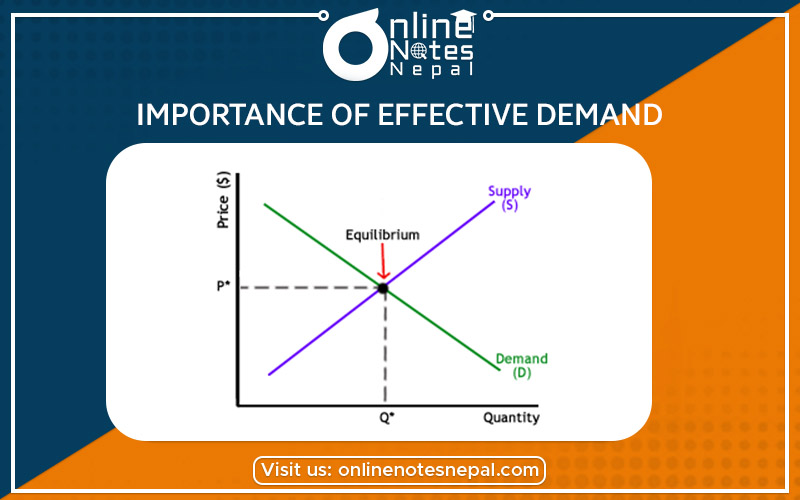Published by: sadikshya
Published date: 18 Jun 2021

The principle of effective demand is the most important contribution of Keynes. A deficiency of effective demand causes unemployment. The Principle of Effective Demand has its importance on the following counts. They are:
1) The determinant of Employment:
In the equilibrium position, aggregate demand and aggregate supply are equal to each other. In addition, the theory of employment can be obtained by effective demand. In turn, effective demand is equivalent to the expenditure made on consumption and investment products. Therefore, an increase in consumption or investment would lead to an increase in effective demand. As a result, employment in an economy would also incrDemanease. Thus, we can say that consumption and investment play a crucial role in determining income and employment.
2) Role of Investment:
Economic growth comes from those parts of an economy which can increase productivity by the use of energy and mechanization: this means manufacturing and some services which can make use of IT. This means not all investment is equal in its effect on growth: investment in infrastructure, education, and roads will generally provide a return only in line with interest rates (i.e. borrowing costs). It is an investment in manufacturing that increases productivity, i.e. output per head, especially light manufacturing. If you look at those emerging economies that have raised living standards in recent decades they have all invested in manufacturing. One key point is that for manufacturing to be profitable, and hence to attract investment, the exchange rate must be competitive. It must be adjusted for whatever existing level of productivity a country has.
3) Emphasis on Demand Side:
In contrast to the classical Emphasis on the supply side, Keynes laid more emphasis on the demand side and traced fluctuations in output and employment to changes in aggregate demand. Aggregate supply is assumed to be in a short period.
4) The paradox of Poverty:
The paradox of poverty is exemplified by countries that have the resources to eliminate poverty but are unable to do so because of the economic inequality present in those countries. Consider the U.S., in which some state is the richest country in the world. We still have a significant number of citizens living in poverty because of the growing divide between the rich and the poor. The middle class is shrinking in size at an alarming rate. The advanced capitalist economies are always under constant fear of unemployment and panic of depression. The reason is that as income increases, consumption also increases, but by less than the increase in the employment and panic of depression. This gap between income and consumption widens at higher levels of employment and not removed automatically without the active participation of the government.